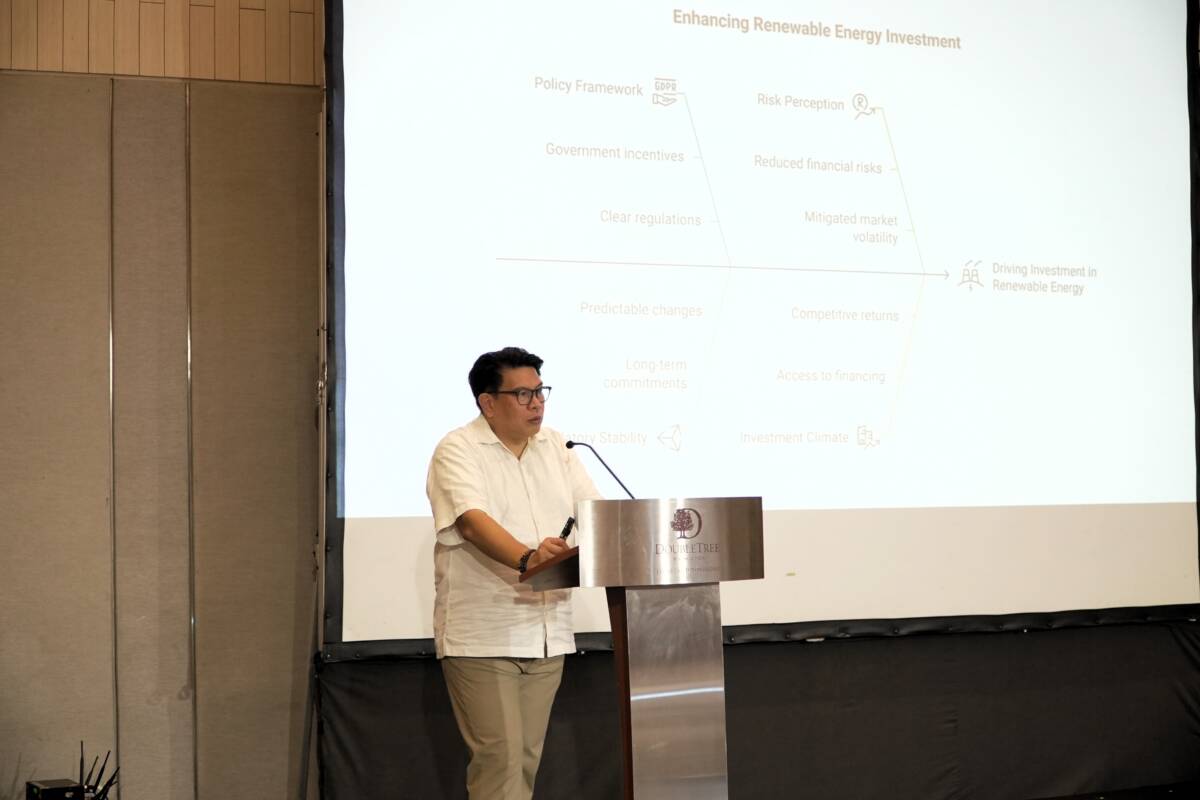Jakarta, March 24, 2025 – Indonesia has set a target for renewable energy mix, greenhouse gas emission reduction, and achieving net-zero emission status by 2060 or sooner. In an effort to achieve these targets, investment is absolutely necessary. However, since 2019, the realization of renewable energy investment has always been below the set target.
Fabby Tumiwa, Executive Director of the Institute for Essential Services Reform (IESR) in the Discussion on Accelerating Policy Reform for Net Zero Emission (NZE) and Eight Percent Economic Growth organized by the Green Energy Transition Indonesia Project supported by the British Embassy in Jakarta said that the less than supportive investment climate was the cause of the failure to achieve the renewable energy investment target in the past few years, which resulted in the failure to meet the renewable energy mix target of 23% in 2025 (target according to PP KEN No. 79 of 2014).
“There are at least four things in policy that need to be reformed, namely the policy framework, risk perception, regulatory stability, and access to funding for renewable energy projects,” said Fabby.
Fabby added that business actors consider the quality of Indonesia’s investment climate to be still low, especially for matters relating to policy and regulation. This is stated in the Indonesia Energy Transition Outlook (IETO) 2025 report.
Farah Heliantina, Assistant Deputy for Energy Transition Acceleration, Coordinating Ministry for Economic Affairs, stated that the government has prepared a roadmap and strategy for accelerating the energy transition while integrating it in an effort to achieve the eight percent growth target.
“Industry will be the key to economic transformation towards Indonesia Emas 2045. Currently, there are 14 programs and 11 main projects with various funding schemes: from the APBN, BUMN, to the private sector. In addition, there are 25 Special Economic Zones (KEK) being developed, including the solar panel industry KEK in Batam,” he said.
Tubagus Nugraha, Executive Director of Economic Priority Program Policy Synchronization, National Economic Council, said that because the energy transition is a complex concept, comprehensive planning is needed.
“One of the issues in implementing the energy transition, for example, is the high coal exports. New renewable energy will be successful if the market is regulated, including price disparities. We are currently thinking about the solution,” he said.
Hendra Iswahyudi, Director of Energy Conservation, Ministry of Energy and Mineral Resources explained the current priority direction of the government regarding the energy sector, one of which is by encouraging the downstreaming of nickel minerals.
“Regarding efforts to reduce emissions, in addition to the supply sector, we are also encouraging demand regulation, one of which is through energy efficiency and conservation as regulated in PP 33/2023,” said Hendra.
Policy dynamics are important to look at seriously because this will directly affect the perceptions of investors and capital owners and influence investment decisions. This was conveyed by Elvi Nasution, Country Manager of ING Bank Indonesia.
“Although the policy dynamics are moving towards decarbonization, we see that there is still a big gap in terms of implementation. The process concerning project execution and enforcement of policy regulations needs to be implemented in more detail and consistently,” he said.
Indonesia received Just Energy Transition Partnership (JETP) funding in 2022 and has prepared a Comprehensive Investment Policy Plan (CIPP) document and launched it in 2023. This document contains a number of policy reform needs to support Indonesia’s JETP target, namely achieving peak emissions in the electricity sector by 2030 and achieving a renewable energy mix of 34% by 2030.
Along with the dynamics of Indonesia’s energy policy, the Indonesian JETP Secretariat feels that the JETP CIPP document needs updating. Paul Butarbutar, Head of the Indonesian JETP Secretariat, stated that in terms of policy reform, there are several additional policy items that need updating.
“There are four new policy proposals that we have submitted. So there are a total of six policies that we have proposed. First, reducing emissions from the start in captive PLTU. Second, electrification by determining the proportion of electric cars. Third, a carbon economic value scheme that can encourage decarbonization. Fourth, a just transition can be adopted by all sectors. Fifth, a more measurable reform of the PLN procurement system so that it can invite investors,” said Paul.

